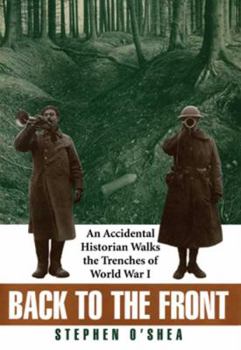Back to the Front: An Accidental Historian Walks the Trenches of World War I
Select Format
Select Condition 
Book Overview
World War I is beyond the memory of almost everyone alive today. Yet it has left as deep a scar on the imaginative landscape of our century as it has on the land where it was fought. Nowhere is that... This description may be from another edition of this product.
Format:Hardcover
Language:English
ISBN:0802713297
ISBN13:9780802713292
Release Date:May 1997
Publisher:Walker Books
Length:216 Pages
Weight:1.31 lbs.
Dimensions:9.3" x 1.0" x 6.3"
Customer Reviews
5 ratings
Truly a 5 Star Read
Published by Thriftbooks.com User , 19 years ago
Can't remember what possessed me to read this book, but I have never regretted it and given many copies of it as gifts. This book is really a bit of a travelogue in many respects. The author walks from one end of the Western Front (WWI) to the other and his engaging, journal style narrative brings you along for a fascinating ride. After spending decades walking battlefields of the American Civil War, I found it intriguing to follow O'Shea's journey through the terrible battlefields of the War to End all wars. His experiences as he traverses ordnance and relic filled trenches and forests to the many memorials are really insightful and differ greatly from the kind of lionization of American Civil War battlefields that is so prevalent today. In fact, the battlefields of the Great War seem to lie in a wierd sort of isolation. O'Shea frequently stumbles upon long deserted villages (this in the heart of Europe) and the experience is discomforting. And this is perhaps as it should be. These tortured fields of the Western Front were the scene of the greatest mass slaughter of armed humanity the world has yet experienced. Indeed, his journey and experiences are in fact lighter and more sanguine than dark and despairing. O'Shea never strays too far in over-moralizing the futility of war, but of course the evidence he encounters conveys the true waste of war more than written words ever can. I would like to have walked with O'Shea and in rereads of this excellent book, do so frequently.
Very Well-Done
Published by Thriftbooks.com User , 26 years ago
An excellently written, thoughtful, and sometimes passionate. I do not accept the author's personal view completely, but he is a sincere observer and a skilled writer. A highly recommended book.
Deeply Moving
Published by Thriftbooks.com User , 26 years ago
I loved this book. I spent 30 years in the British Army and walked these battlefields many times. To those who know little of war, it is easy to dismiss this author's ideas. But to those of us who have direct experience of military stupidity, the kind of leadership that wastes lives, the kind of foolishness that the common soldier rises above, the author's words ring true. The description of the Western Front is beautifully done and over all this book is quite exceptional.
Great Geography of the Great War
Published by Thriftbooks.com User , 26 years ago
An excellent introduction to the geography of the Great War. Until reading Back to the Front, I hadn't had a good mind-picture of the countryside that formed the stage for WW I. Whether reading fictional accounts or the occasional history, I found myself quite familiar with the names but not the spatial relationships of one great battle to the next. By actually walking the Western Front, O'Shea becomes a human reference point: his simple walking pace brought Ypres, Passchendaele, Vimy Ridge, Messines and all those familiar names into proportion. For example, Passchendaele is withing walking distance of Ypres; maybe 10 km away.The passage of time also is quite interesting. O'Shea walked and visited the Western Front some 70 to 80 years after. The Essex Farm Cemetery where McCrae was inspired to write "In Flanders Fields" is "almost in the shadow of a traffic cloverleaf."
part history, part travelogue, part pacifist manifesto
Published by Thriftbooks.com User , 27 years ago
In none of the histories of WWI that I've read have I seen a translation of "Passchendaele." Although I knew that 800,000 men died there, until I read this book I didn't know that the word actually means "Valley of Crucifixion." Knowing this makes a difference. At least it does for me. It's in small things like this that I readily saw the difference between what O'Shea has written and traditional history with its litany of names, dates, places and numbers. While O'Shea has done his homework and is very knowledgable about the war, because of the travelogue style in which he writes, his book makes the war less distant, less abstract and more real. I could read a hundred history books telling me about the million three-hundred thousand men who died at the Somme, but none of them would have the impact of someone telling me about how he stumbled upon a busted helmet in a wheat field there. Though my brain can absorb a number, my heart can't; what my heart absorbs is the helmet.I lived in Germany for two years. I visited the Somme battlefield. I had no words to describe what I saw and felt there. I'm grateful that O'Shea did.





